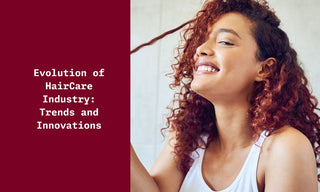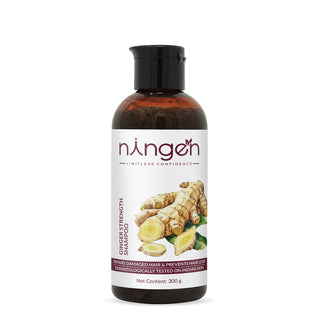For those who grew up in the ’80s and ’90s, the world of haircare often meant DIY solutions like reetha and shikakai shampoos, Bhringraj pastes, and the ritual of daily coconut oil massages. These traditional remedies were the go-to choices for nourishing hair naturally, long before the rise of today’s sophisticated haircare products. The haircare industry has come a long way from simple shampoos and basic hair oils. From natural ingredients and eco-friendly packaging to high-tech treatments and personalized care routines, the evolution of haircare reflects our growing desire for healthier, more beautiful hair.
This blog will explore the evolution of the haircare industry, its trends, and innovations, giving you a glimpse into how the industry has transformed and what exciting developments lie ahead. Whether you're a haircare enthusiast or just looking to keep up with the latest in hair health, this journey through the evolution of haircare is one you won’t want to miss!
In This Article;
- Historical Overview of the Hair Care Industry
- Growing Demand for Customized Hair Care
- Advancements in Sustainable Formulations
- Innovative Scalp Treatment Products
- Innovative Packaging Solutions
- Bottom Line
- Quick View
- Frequently Asked Questions
Historical Overview of the Hair Care Industry
The haircare industry has witnessed a dramatic evolution over the centuries, reflecting changes in culture, technology, and consumer preferences. Here’s a brief look at the journey of hair care from ancient remedies to today’s high-tech solutions:
-
Ancient Times: Natural Ingredients and DIY Remedies
In ancient civilizations, hair care relied heavily on natural ingredients. Egyptians used castor oil & almond oil for improving hair health, while ancient Indians used herbs like reetha, shikakai, and amla for cleansing and strengthening hair. These natural remedies were passed down through generations and were seen as essential for maintaining hair health. -
19th Century: The Rise of Commercial Hair Products
The 19th century marked the beginning of commercial hair care products. Early shampoos, often soap-based, became available, and the use of perfumes and oils to maintain hair was common among the elite. This era also saw the introduction of hair dyes, with early formulas often containing harsh chemicals. -
Early 20th Century: The Birth of Modern Hair Care Brands
The early 20th century saw the emergence of iconic hair care brands like L’Oréal and Revlon. The development of synthetic ingredients allowed for new formulations, and products like hair sprays, conditioners, and specialized shampoos began to appear. This era was also marked by the influence of Hollywood, where glamorous hairstyles set new trends. -
1960s-1980s: Shifts in Hair Care Trends and Natural Movements
The 1960s and 1970s witnessed a return to natural looks, influenced by the hippie movement and a growing awareness of chemical-free living. DIY hair care, using ingredients like egg yolks, lemon, and vinegar, gained popularity. The ’80s, however, saw a turn towards voluminous, styled hair, leading to a surge in demand for styling products like mousse, gel, and hairspray. -
1990s-2000s: Focus on Hair Health and Specialized Products
The late 20th century and early 2000s brought a shift towards hair health, focusing on nourishing and repairing hair rather than just styling. Sulfate-free shampoos, deep conditioners, and serums became popular, catering to specific hair types like curly, damaged, and color-treated hair. -
2010s-Present: Clean Beauty and Technological Innovations
The Clean Beauty Movement defines the current era of hair care, emphasizing natural, organic, and eco-friendly products. There is also a rise in personalized hair care, where products are tailored to individual hair needs. Innovations like scalp care, hair masks, and bond-repairing treatments have taken center stage. Additionally, technological advances have led to hair care tools that minimize damage, like ionic hairdryers and infrared straighteners.
Also read: The evolution of skincare industry.
Growing Demand for Customized Hair Care
The hair care industry has evolved significantly, with consumers increasingly seeking personalized solutions tailored to their unique hair types and concerns. Major brands like Procter & Gamble, Henkel, Beiersdorf, and Kao are embracing this trend, focusing on products that go beyond generic needs to address individual factors such as hair texture, scalp conditions, and even genetic profiles.
This demand has led to innovations like AI-driven hair diagnostics and custom-formulated products, enhancing the precision and effectiveness of hair care routines. As a result, consumers, particularly in regions with higher disposable incomes like North America and Asia Pacific, are investing in these specialized, personalized solutions.
Personalization Trends in Hair Products
Personalization is at the forefront of hair care innovations, catering to the growing desire for customized experiences. Key trends include:
- Custom-formulated products: Personalized shampoos and conditioners based on online questionnaires assessing individual hair concerns.
- Advanced analysis technologies: Scalp and hair strand analysis tools that guide targeted product recommendations.
- Subscription models: Ongoing product customization and adaptation based on regular hair assessments.
These trends in the evolution of the haircare industry move away from the one-size-fits-all approach, delivering products that address specific hair care needs and preferences.
Importance of Individual Hair Types and Concerns
Acknowledging unique hair types—whether curly, straight, fine, or coarse—and specific concerns such as frizz or scalp sensitivity is crucial in today’s market. Factors driving the need for personalized care include:
- Genetic variations: Hair properties vary widely due to genetics, necessitating customized care.
- Environmental factors: Climate and pollution impact hair health, requiring tailored protection and repair.
- Cultural practices: Diverse styling habits and hair care routines around the world influence product requirements.
Customized hair care meets these varied needs, aligning with the trend towards conscious consumerism where users prefer natural, organic, and chemical-free formulations. The industry's shift towards personalization not only enhances customer satisfaction but also reflects a deeper understanding of hair biology, delivering products that truly meet individual needs.
Advancements in Sustainable Formulations
The haircare industry is increasingly embracing sustainable formulations in response to environmental concerns and consumer demand for eco-friendly products. Modern formulations are moving away from harmful chemicals like sulfates, parabens, and silicones, focusing instead on greener alternatives that reduce environmental impact.
Innovations in the journey of evolution of the haircare industry include biodegradable packaging, recycled plastics, and concentrated formulas that minimize packaging waste and lower transportation carbon costs. Waterless haircare products are also gaining traction, offering effective results while conserving water. Leading companies like Kao Corporation and Henkel are investing heavily in research to develop high-performance, sustainable haircare solutions that align with these eco-conscious trends.
Eco-friendly Ingredients in Hair Care

Technology’s Role in Hair Care Innovations
Technology has fasttracked the pace of evolution of the haircare industry, driving growth and enabling more effective solutions for diverse hair concerns. From digital hair health analysis to personalized care routines, tech advancements are reshaping modern hair care.
Smart Devices and Tools
Innovative tools like smart hairbrushes, equipped with sensors, provide feedback on hair condition and sync with apps for personalized routines. Advanced hair dryers, laser therapy devices, and high-tech styling tools adjust settings based on hair needs, minimizing damage and enhancing care efficiency.
AI Applications in Product Customization
AI and machine learning enable personalized hair care through scalp analysis, custom product formulation, and performance tracking. These technologies offer bespoke solutions tailored to individual hair needs, moving beyond the one-size-fits-all approach and meeting consumer demand for personalization.
In conclusion, technology is redefining the hair care landscape, enhancing routines, and aligning with consumer preferences through smart devices and AI-driven personalization.
Also read: Does straightening damage hair?
Innovative Scalp Treatment Products
Product innovations in scalp treatment have advanced considerably. Today's market offers a variety of cutting-edge products catering to a wide array of hair and scalp issues. Here are some of the innovative solutions that are redefining scalp care:
- Scalp Scrubs and Exfoliants: Designed to remove dead skin cells and product build-up, promoting a cleaner, healthier scalp.
- Scalp Masks: Intensive treatment products that offer deep hydration and repair.
- Topical Serums: Lightweight, nutrient-rich formulas targeting specific scalp conditions such as hair loss or irritation.
- Microbiome Balancers: Products that aim to nurture and protect the scalp's natural flora for optimal health.
- Sun Protection: A range of SPF-infused products specifically for scalp protection against harmful UV rays.
- AI-Driven Scalp Analysis Tools: Gadgets and apps that use artificial intelligence to assess scalp conditions and suggest personalized product regimes.
The future of scalp-care treatment seems to hinge on continuing to embrace technological innovations and harnessing the power of natural ingredients to meet consumer demand for personalized, effective, and gentle solutions.
Innovative Scalp Treatment Products

Innovative Packaging Solutions
The hair care industry is no stranger to innovation, not just in product formulations but also in packaging design.
Modern haircare treatment products are now available in a variety of unique containers aimed to enhance both aesthetics and functionality. Some packaging solutions have been lauded for their novel dispensing mechanisms which provide ease of use and help control product quantity to prevent waste.
Improved packaging solutions also include smart labels and connected packaging, enhancing interaction between the brand and consumer. These can offer additional value such as usage tips, in-depth product information, and augmented reality experiences. Innovations such as refill pouches and pump dispensers highlight the industry's versatility in offering convenience while addressing demand for hair care products that are both accessible and visually appealing.
The Impact of Pop Culture on Hair Care
Pop culture has significantly shaped the haircare industry during its evolution, with trends from movies, music, and public events quickly influencing hairstyles and products. Social media amplifies these trends, spreading them rapidly among audiences. Celebrities experimenting with bold hairstyles often spark waves of public imitation, driving demand for specific hair care products. Influencers and beauty bloggers further extend pop culture’s reach, popularizing new hair care practices and products.
Celebrity Endorsements and Trends
Celebrity endorsements strongly impact consumer preferences in hair care. When high-profile figures debut new hairstyles, salons see immediate requests for those looks. The industry leverages these trends by partnering with celebrities to promote products, knowing their influence can drive significant changes in consumer buying behavior.
The following table illustrates some common types of celebrity endorsements and the expected consumer responses:

The Bottom Line: Current and Future Directions in the Hair Care Market
The evolution of the haircare industry is dominantly driven by technological advancements and shifting consumer demands. The rise of AI hair tests has enabled personalized haircare solutions, allowing brands like Kao Corporation, Henkel AG, Procter & Gamble, and Beiersdorf AG to offer tailored treatments based on precise hair diagnostics. Natural ingredients are increasingly favored, with a growing trend toward organic and chemical-free products addressing consumer concerns about hair health.
E-commerce continues to expand as a major distribution channel, offering convenience and a wide range of options. Looking forward, sustainable practices will play a larger role, with innovations in packaging and formulations focusing on reducing environmental impact and enhancing eco-friendliness.
Quick View
The hair care industry has evolved from ancient DIY remedies like reetha, shikakai, and Bhringraj to modern, technologically advanced products. Over the centuries, hair care practices have shifted from natural ingredients to commercial products, with major developments occurring in the 19th and 20th centuries with the rise of synthetic formulations and iconic brands. The current landscape focuses on personalized, eco-friendly, and sustainable products, propelled by advancements in AI, technology, and a growing preference for natural and organic ingredients.
Key trends include the demand for customized hair care solutions, the role of technology in product formulation, smart devices, and sustainable packaging. Pop culture continues to influence hair care trends, with celebrities and influencers driving public demand for new styles and products. The industry's future looks set to focus on personalized experiences, sustainability, and leveraging technology for innovative solutions.
Frequently Asked Questions
-
How has the hair care industry evolved over the years?
The hair care industry has evolved from natural DIY remedies in ancient times to modern, high-tech, and personalized products. Major milestones include the commercialization of shampoos in the 19th century, the rise of synthetic formulations in the 20th century, and the current focus on sustainable and personalized solutions. -
What were common hair care practices in ancient times?
Ancient hair care relied on natural ingredients such as reetha, shikakai, amla, castor oil, and almond oil, which were used for cleansing, nourishing, and strengthening hair. -
What role does technology play in modern hair care?
Technology plays a significant role in modern hair care by enabling personalized solutions through AI-driven diagnostics, smart devices for hair health monitoring, and advanced tools that minimize damage during styling. -
Why is there such a growing demand for personalized hair care products?
Consumers are increasingly seeking products tailored to their unique hair types and concerns, driven by factors such as genetic differences, environmental impacts, and diverse cultural practices. AI hair tests and custom-formulated products cater to these needs. -
What are some key sustainable trends in the hair care industry?
Key sustainable trends include the use of eco-friendly packaging, biodegradable and concentrated formulations, waterless products, and the reduction of harmful chemicals like sulfates and parabens. -
How does pop culture influence hair care trends?
Pop culture, driven by celebrities and social media influencers, significantly impacts hair care trends. Bold hairstyles and colors often set by public figures can create widespread consumer demand for specific products and looks. -
What are some popular natural ingredients in hair care products?
Popular natural ingredients include aloe vera, argan oil, tea tree oil, and shea butter, known for their moisturizing, soothing, and nourishing properties. -
What innovations are shaping the future of hair care?
Future innovations include AI-driven product customization, sustainable packaging solutions, advanced scalp treatments, and smart devices that provide personalized feedback and care routines. -
How has the hair care industry adapted to changing consumer preferences?
The industry has adapted by embracing clean beauty, focusing on natural and chemical-free ingredients, and developing personalized products that cater to individual hair care needs. -
What are some emerging technologies in hair care?
Emerging technologies include AI hair diagnostics, smart hairbrushes, laser therapy devices for hair growth, and advanced styling tools that adjust settings based on hair type and condition.









